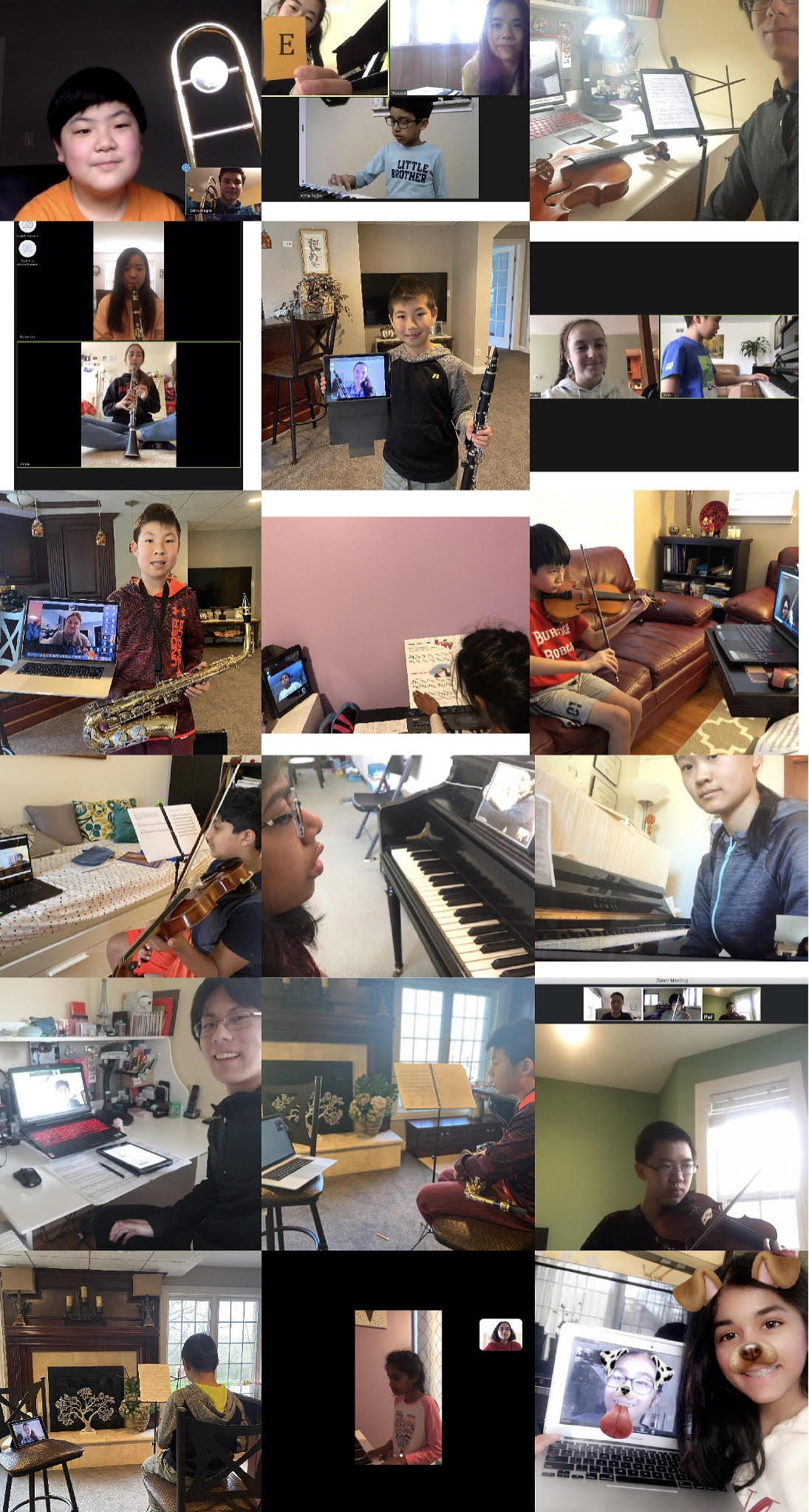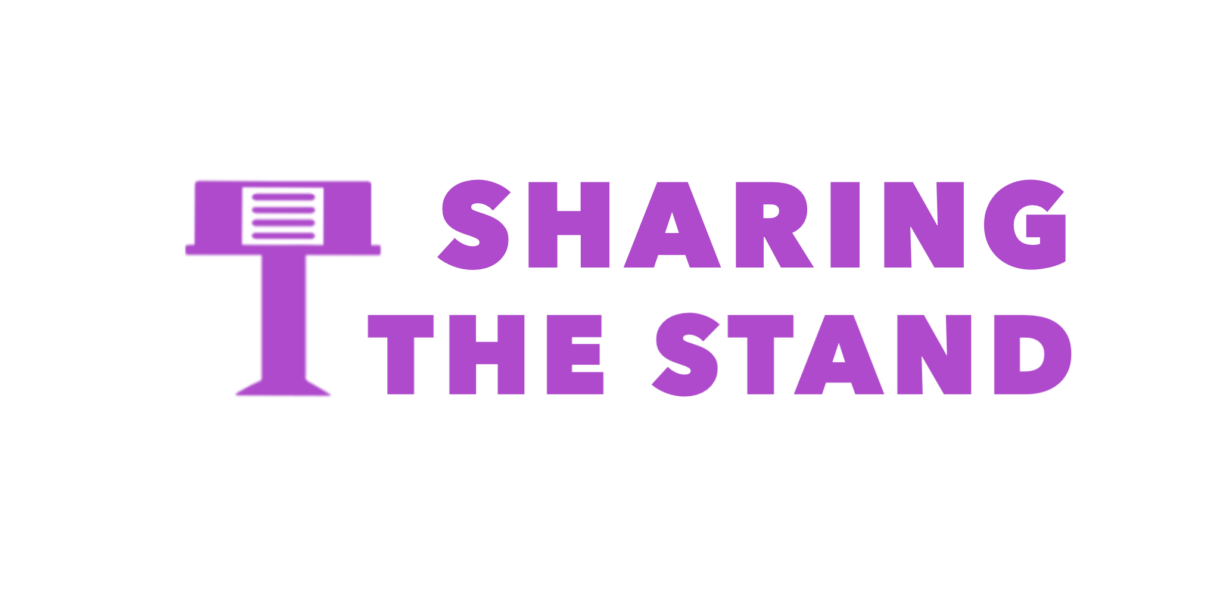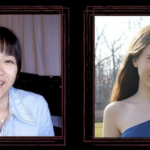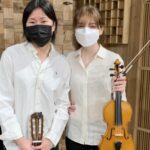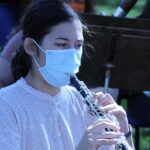Today, I profile an organization called Sharing the Stand that connects elementary and middle school students with high school and college aged music mentors. Instrument-specific mentors work one-on-one with students in free mentoring sessions. I had the chance to meet with two flutists playing an integral role in this organization, both a member of the Chicago Youth Symphony Orchestras: Rosie Wang, co-founder and co-CEO of Sharing the Stand and a rising senior at Adlai E. Stevenson High School, and Anika Veda, COO of Sharing the Stand and incoming senior at William Fremd High School.
Sharing the Stand is a unique program that’s offering free, online musical mentorship to younger students, and a chance to be a mentor to older students! I absolutely adore teaching, and find that young students can benefit greatly from a mentor/teacher who’s somewhat close to their age. With the excellent programming and management that this Illinois-based organization has, I highly recommend that people take advantage of the wonderful opportunities that Sharing the Stand offers!
Visit Sharing the Stand at their website: https://www.sharingthestand.org/
Also, connect with Sharing the Stand on Facebook or Instagram: @sharingthestand
Eva: Hi Rosie and Anika! I’m really excited to hear about Sharing the Stand from you today.
Could you tell me about this organization’s mission?
Anika: Yes! So the main idea of the program is that we connect elementary and middle school students with a high school or college-aged mentor. Mentoring sessions take place once a week usually, and a mentor meets with a student. The student can ask the mentor about any problems that they are having, or they can work with the mentor on certain pieces.
Rosie: Originally, my co-founder Linda and I started Sharing the Stand thinking that it would be great during the Covid-19 pandemic to keep students motivated to practice, since a lot of the in-person lessons were suspended. We thought that virtual lessons would be a good way to keep students motivated. We wanted to keep them free so that people who were low-income or don’t have access to an instrument, or a teacher, would be able to get a good music education. But with the success we had with students and mentors, it quickly became something we didn’t want to keep just as a pandemic project. We chose to rename our organization from “”Covid Music Mentors” to “Sharing the Stand,” and decided to keep it a permanent thing. From there, we branched out and started other initiatives as well!
Anika: Some other things we’ve done with the program include multiple virtual student recitals. We did a couple of those last summer, and a winter and spring one, and we are hoping to continue the recitals. That’s been a really nice way for us to fundraise for various causes that mean a lot to us, and for the students to have a chance to perform. It’s nice to be able to do that live over zoom, especially in a pandemic where we don’t really have the opportunity to perform in person.
E: It’s very neat how you’ve been able to carve out all these different opportunities for students and mentors.
I know from my experience that coordinating just the students I teach is a lot. Knowing you started a whole organization based on this is crazy! I’m curious how you got this organization started, and what the brainstorming process for Sharing the Stand was like? Obviously it’s an enormous effort to create something of this scale.
R: It started off pretty simple, with the idea of one-on-one lessons with high school and college age mentors with younger students. We made two google forms, one for anyone who’s interested in teaching, and one for the students. At first everything was very manual and we had to do it all by hand, looking at different factors for mentors, such as how many years of experience they had, to pair them up with a student. We wanted our pairings to be most beneficial for our students and mentors. Slowly from there, we started to make things more automatic, since we used spreadsheets and sent out more automated emails. When students sign up, they get an email that introduces them to everything they need to know about the program. The recitals started as a good opportunity for students to perform under pressure, and they keep students motivated.
A: The brainstorming process was tricky at first. It was so hard to keep ourselves organized, and to figure out what each one of us had to do. We had to coordinate a lot of information, so it was a bit of seeing what works and what doesn’t work. Eventually we figured out a good system for pairing people together, like Rosie said. One of the big things we’ve had to be aware of is what time zone the student is in! We realized at the beginning that this is going to be more than an Illinois thing. We wanted it to span over the whole country.
E: Yeah, and I can attest to the fact that it’s always more work than one might think! So I applaud you for doing that, I’m sure it’s a lot to keep on top of everything. Do you know about how many students and mentors you currently have involved in your program?
A: It’s about 100 students and mentors.
E: That’s awesome, that’s a lot!
R: It’s something like that, obviously things have changed, some students joined, some dropped, but it’s around that number. It’s been going pretty strong, we had the sharpest rise of people signing up at the beginning of the pandemic, but the involvement is still growing. We’re hoping that will continue!
E: You mentioned how you expanded and got students involved outside of Illinois. Did most of your students come from your school district, or are they from different backgrounds? How have you dealt with that?
R: Actually, we’ve seen a lot of diversity with our mentors. We had a spike recently where we had mentors signing up from Europe and India which was super cool to see. But at first, most of our students were based around our school district and the Chicago area. From there, things slowly spread through word of mouth, and we reached out to different youth orchestras and our old band and orchestra directors just to spread the word. Also, at first our search engine optimization wasn’t great, so it would have been difficult to find our information through a google search. but now you’re able to find it more easily. People looking online can now easily access our website. The power of the web has really allowed us to broaden our horizons.
E: Yeah, that’s cool! You really took advantage of those tools available.
I wanted to ask you, have you taught any lessons or been a mentor yourself in the program? If not, do you have any stories of anyone who’s been a mentor who’s had a great experience with it?
A: Actually, I was mentoring a student back in the beginning of the pandemic with Sharing the Stand, and that was pretty crazy for me since it was my first time teaching. So, I was learning how to teach for the first time, along with him learning flute from me. I never realized how hard it is to explain different facets of playing until I started teaching. Flute is not intuitive to talk about – explaining how to produce vibrato, or how to produce a clear sound, was a little complicated at first! Usually you’d watch, listen, and learn. It’s so much easier in person because you can look up close. But after meeting with a student every single week – I taught him from the beginning of the pandemic to when school started in August – we got to know each other and built a long distance connection. It was a really fun opportunity. And now I love teaching so much more!
E: Definitely! But also being online, as you said, adds some new difficulties. I taught a lot of violin students online this summer, and the thing they always struggle with is the bow hold. Which is so easy to do in person, but online it’s nearly impossible to explain! Rosie, do you have any experiences yourself?
R: I haven’t personally mentored any students in our organization, just because I think it’s better for me to stay on the administrative side of things, but I will say it’s been the greatest privilege to hear about all the different testimonials from our mentors. For example, we had a piano student who has autism and had some difficulty focusing on her lesson. We had a very mature mentor for that student, and the student’s mom was really appreciative of that. We always get lots of adorable pictures of our little students too, with a selfie of a laptop and their mentor on zoom.
E: It sounds like a great experience to be a mentor as well. Could you walk me through the process of becoming a mentor? How would you go about that, and what qualifications would you need?
R: If you want to become a mentor, it’s really simple! On sharingthestand.org, there is a main page with two big buttons, and one of them is for signing up to be a mentor, and one of them is for signing up to be a student. You don’t have to be overly qualified! We have mentors ranging all different experience levels. For the mentors who are worried that they haven’t been playing their instrument for an incredibly long amount of time, or don’t have teaching experience, we’ll still be able to find you a student! The mentor is able to get good teaching experience, and won’t have to teach a student who’s very advanced. In the google form we will ask about if you’re involved in other music organizations and the years of experience you have with the instrument, but it’s nothing where you have to have specific qualifications since we want to keep it a broad opportunity that a lot of people can take advantage of.
E: Yeah, it’s great that so many people can get involved!
Is the process similar for becoming a student?
A: Yes. On the website there’s a google form to fill out, and the questions are a little different for students: more about what piece the student is currently working on, how long have they been playing, etc., just to gauge the level of the student so that we can pair them with a mentor who will work well with them.
E: And for lessons, does it depend on the mentor and the student how that would be formatted?
A: Yeah, it depends entirely on them. If you’re teaching a little kid, a 2nd grader or something, you don’t want to put them through hour long lessons. But, I was mentoring a middle school student, so we did 45-minute or hour long lessons since he was more up for that. We leave it for our mentors and students to figure out themselves. And then, the mentors have a form where they log all their volunteer hours with us, so on that form they specify how long the lessons were. When we’re signing off volunteer hours, or just want to know how long the lessons were, we’re still able to check.
E: Great – it’s nice to stay organized.
This is somewhat of a random question, and I usually ask this to people when I’m interviewing them … is there any piece of music that you think everyone should listen to, if you could convince everyone reading this to listen to it?
A: That’s a tough one, let me think …
E: I know, sorry, for me it’s always so hard for me to decide on one thing …
R: I would say, in terms of orchestral repertoire, being in CYSO (Chicago Youth Symphony Orchestra) one of the favorite things I’ve played is Respighi’s Fountains of Rome, it’s just such a good piece, I absolutely love it. Also I know this is a classic, and basically anyone who plays orchestral repertoire knows this, but Stravinsky’s Firebird is also really nice to listen to! So those are two of my favorite orchestral pieces. Definitely recommend listening to flute concertos too!
A: There are sooo many good flute concertos. For orchestra rep, I agree with Rosie, Firebird, the flute part of that is crazy, but it’s so fun. I really like flute-centric pieces … everyone should listen to Daphnis [et Chloe, by Ravel].
E: Oh, I agree!
A: So good. And then, Rosie, since you mentioned flute concertos, I’m really partial to the Nielsen, I love it. It’s fun to play and even more fun to listen to; there are so many characters in that piece.
E: I’ll have to listen, I haven’t heard it before! Thank you for that recommendation.
Lastly, how can people reach you if they want to get involved?
R: Students and mentors can sign up through the google forms on the website. Anyone who wants to reach Sharing the Stand can contact us on our website through the chat box or through email, [email protected]. We also have Instagram, @sharingthestand, and Facebook, Sharing the Stand. If anyone has questions about being a student or being a mentor, or wants to do a collaboration, they can find us there. We always appreciate ideas and feedback!
